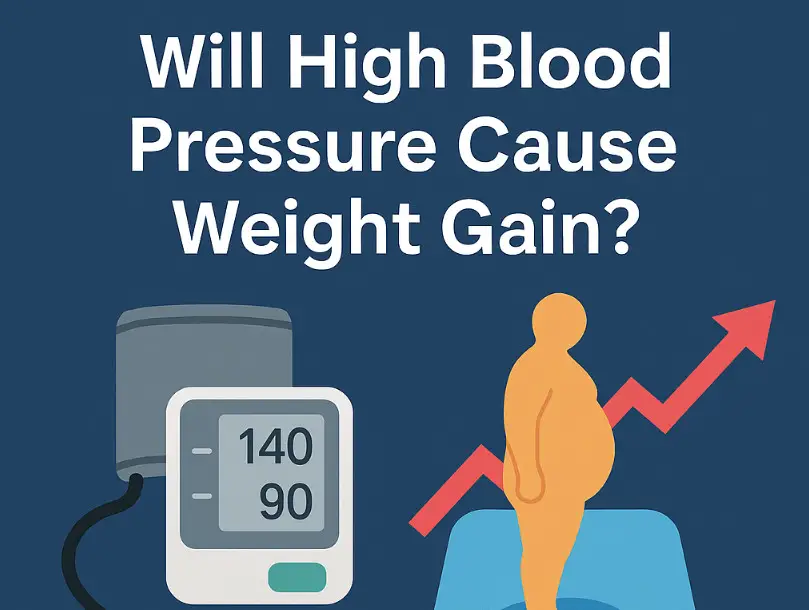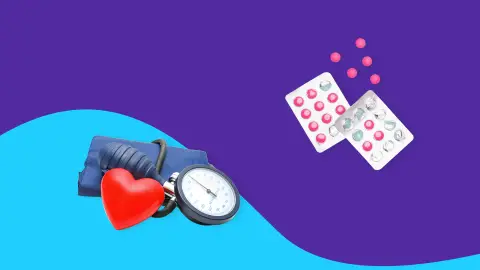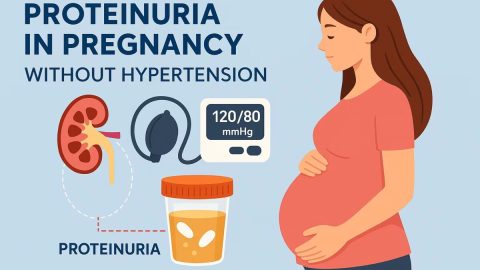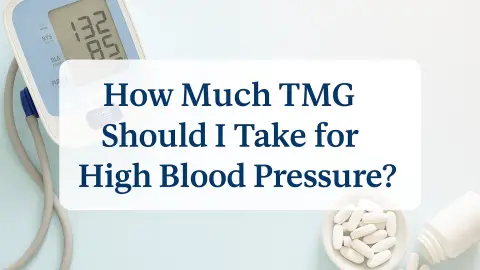High blood pressure and weight gain are two common health concerns that often appear together, leading many people to assume one directly causes the other. The question “Will high blood pressure cause weight gain?” is far more complex than it appears. Hypertension itself does not usually lead to weight gain, but the biological changes behind it, along with lifestyle, medications, and hormonal responses, can create an environment where weight gain becomes more likely.
While weight gain is a well-established contributor to high blood pressure, the reverse relationship is less straightforward. Hypertension can influence metabolic processes, fluid balance, stress hormones, sleep quality, and even physical activity levels. These physiological factors can make maintaining a healthy weight more challenging. In addition, many individuals with hypertension are prescribed medications that can lead to increases in appetite or water retention, creating indirect pathways toward weight gain.
Understanding how these mechanisms interact is essential for anyone managing chronic blood pressure issues. The goal is not simply to identify whether hypertension causes weight gain, but to understand how the two conditions influence each other in a broader metabolic and cardiovascular context. This article explores the relationship in depth, breaking down scientific explanations, real-world factors, symptoms, and ways to manage both conditions safely and effectively.
How High Blood Pressure Affects the Body
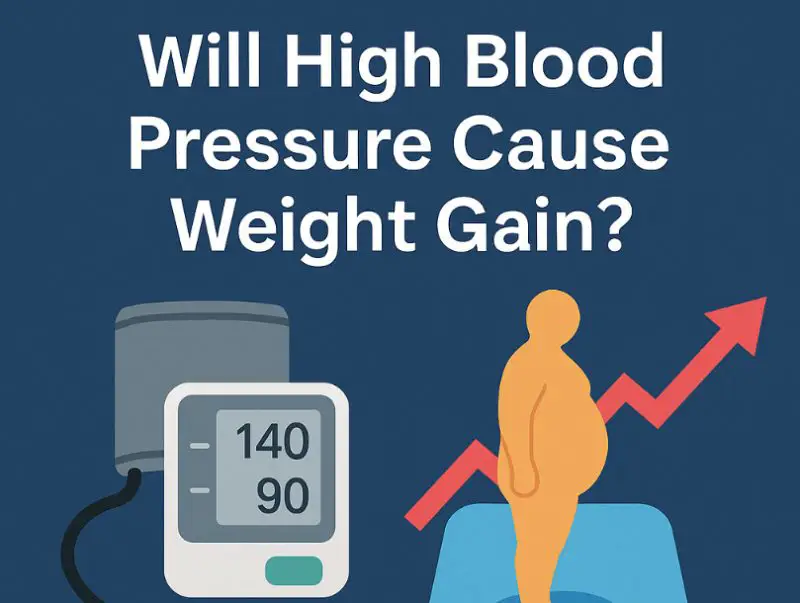
The Role of Cardiovascular Strain
High blood pressure places persistent stress on the cardiovascular system. Over time, arteries become stiffer and less able to expand, making it harder for blood to circulate efficiently. This strain forces the heart to work harder, increasing energy demand while reducing overall endurance. As a result, some individuals may naturally reduce their physical activity levels, not because the condition directly causes weight gain, but because exercise becomes more uncomfortable or tiring.
Reduced physical activity is one of the most common indirect links between hypertension and weight gain. People who previously exercised regularly may notice fatigue, chest tightness, or shortness of breath during routine workouts. When physical activity declines gradually, caloric output decreases. Even small reductions in daily movement can contribute to weight gain over months or years, especially for individuals with metabolic vulnerabilities.
These cardiovascular changes also affect the body’s ability to regulate temperature, oxygenation, and stamina. When blood vessels cannot dilate properly, muscles receive less oxygen during physical exertion. This makes workouts feel more draining, reducing motivation and consistency. Over time, these limitations can significantly influence weight stability.
The Impact on Fluid Retention
Fluid retention is another subtle mechanism linking hypertension with weight changes. When blood pressure is elevated, the kidneys may struggle to regulate sodium and water effectively. This leads to intermittent or chronic fluid buildup, especially in the legs, feet, and abdomen. While this retention is not the same as fat gain, it does increase body weight on the scale, sometimes by several pounds.
Fluid retention can also cause bloating and discomfort, making exercise or movement more difficult. As swelling increases, joint strain may worsen, particularly in individuals with arthritis or metabolic disorders. This discomfort can further discourage physical activity, indirectly contributing to actual weight accumulation over time.
In some cases, the kidneys compensate for elevated blood pressure by altering hormone levels related to fluid balance. These hormonal changes may influence appetite, thirst, and salt cravings, creating a physiological drive toward eating patterns that support weight gain.
Hormonal Stress Responses
Chronic high blood pressure triggers hormonal responses that complicate weight regulation. The body may produce more cortisol and adrenaline, two stress hormones that affect metabolism, appetite, and fat storage. Elevated cortisol, in particular, is linked to increases in abdominal fat, increased cravings for high-calorie foods, and changes in how the body processes glucose.
Stress hormones also influence sleep patterns, which are critical for weight regulation. Poor sleep quality raises ghrelin, the hunger hormone, while lowering leptin, the satiety hormone. These shifts create a hormonal imbalance that favors weight gain. Over time, persistent sleep disruption can influence insulin resistance and metabolic rate, further complicating the relationship between hypertension and weight.
Does High Blood Pressure Directly Cause Weight Gain?
The Direct Relationship: What Science Shows
Most research indicates that high blood pressure itself does not directly cause fat accumulation or increased body mass. Instead, the condition interacts with systems that regulate appetite, metabolism, and physical activity. Hypertension is not a metabolic disorder in the same sense as diabetes or hypothyroidism, which directly slow metabolism or alter energy use. Rather, it influences the body in ways that make weight gain more likely under certain circumstances.
The confusion often arises because hypertension and weight gain frequently occur together. Obesity is one of the strongest predictors of high blood pressure, but the overlap does not mean hypertension inherently causes weight gain. What happens instead is a bidirectional relationship where each condition can worsen the other, creating a cycle that becomes harder to break without targeted intervention.
Although the direct mechanism is weak, indirect pathways carry significant weight. In many individuals, high blood pressure contributes to fatigue, fluid shifts, hormonal changes, and lifestyle modifications, all of which favor gradual increases in body weight. For this reason, many people mistakenly believe hypertension directly causes weight gain.
Why the Link Is Often Misunderstood
The symptoms of hypertension can easily be mistaken for causes of weight gain. Fatigue, headaches, dizziness, and swelling may limit a person’s ability or desire to stay active. Reduced activity may occur so gradually that individuals do not notice the pattern until they have gained several pounds.
Another reason for confusion is that women and older adults experience weight regulation challenges that can overlap with hypertension. Hormonal shifts during perimenopause, menopause, and aging influence weight independently of blood pressure. When these conditions occur at the same time, it becomes difficult to determine which one is responsible for changes on the scale.
The psychological impact of a hypertension diagnosis also contributes to misunderstanding. Some individuals experience anxiety, depression, or stress related to their health condition. These emotional responses can influence eating habits, making changes appear directly tied to blood pressure when they are actually linked to lifestyle adaptation.
Understanding the Indirect Pathways
The indirect pathways through which hypertension contributes to weight gain are well documented. Reduced activity due to fatigue, fluid retention, hormonal imbalances, and medication use all create conditions where weight gain becomes more likely. The accumulation is often slow and steady rather than rapid.
These pathways are not unique to hypertension; many chronic conditions influence weight indirectly. What makes hypertension particularly challenging is that it often remains silent for years, allowing these subtle changes to accumulate unnoticed. By the time symptoms appear, weight gain may already have developed, leading individuals to assume the two are directly linked.
Understanding these indirect pathways helps individuals address the root causes of weight changes rather than assuming blood pressure alone is responsible.
Can Weight Gain Make High Blood Pressure Worse?
The Bidirectional Relationship
While hypertension may indirectly contribute to weight gain, weight gain is a well-established cause of elevated blood pressure. Even a modest increase in body fat, particularly around the abdomen, places additional pressure on the heart and vascular system. This increases the force required to circulate blood, raising blood pressure over time.
Excess fat tissue produces inflammatory molecules that worsen endothelial function, making arteries stiffer and less able to dilate. This increases vascular resistance and elevates blood pressure. As fat mass grows, insulin resistance also tends to increase, further influencing blood pressure regulation through hormonal pathways and sodium retention.
This bidirectional relationship creates a cycle where weight gain worsens blood pressure and elevated blood pressure can interfere with weight control. Breaking this cycle requires addressing both conditions simultaneously.
The Role of Abdominal Fat
Fat stored around the abdomen is metabolically active and releases hormones and inflammatory molecules that directly influence blood pressure. Visceral fat compresses organs, increases systemic inflammation, and alters sodium and water handling in the kidneys. These effects raise blood pressure more significantly than fat stored in other areas.
Abdominal fat also increases sympathetic nervous system activity, raising heart rate and vascular tension. These shifts cause the cardiovascular system to work harder, contributing to elevated blood pressure and reduced exercise tolerance.
Because abdominal weight gain is associated with higher hypertension risk, individuals experiencing increases in waist circumference often see parallel increases in blood pressure readings.
Long-Term Effects on Metabolism
Weight gain slows metabolic rate by increasing hormone dysregulation, reducing muscle mass relative to body fat, and influencing glucose metabolism. As metabolism slows, maintaining weight requires fewer calories, making weight loss more difficult.
These metabolic changes create conditions where blood pressure continues rising, even as lifestyle adjustments are made. Elevated insulin levels caused by weight gain also influence sodium retention, causing fluid buildup that raises blood pressure further.
Thus, weight gain reinforces hypertension through multiple physiological pathways, completing the cycle between the two conditions.
How Blood Pressure Medications Affect Weight
Medications That May Cause Weight Gain
Several classes of blood pressure medications are associated with weight gain or fluid retention. Beta-blockers, for example, can reduce metabolic rate and blunt exercise capacity. People who begin beta-blocker therapy may notice weight gain of several pounds within months. The medication can also increase fatigue, leading to reduced physical activity.
Calcium channel blockers, while not typically associated with fat gain, may cause ankle swelling or water retention. This contributes to weight increases on the scale but does not reflect fat accumulation. For some individuals, this swelling makes walking or exercise uncomfortable, indirectly influencing weight.
Certain vasodilators and older classes of antihypertensives may also influence fluid balance or appetite. Each medication affects individuals differently, and weight changes vary based on dosage, lifestyle, and genetic factors.
Medications That Are Weight-Neutral
Not all blood pressure medications influence weight. ACE inhibitors and ARBs are typically weight-neutral and may even support healthier metabolism indirectly by improving vascular function. Diuretics, which promote water excretion, may reduce temporary weight gain but do not lead to long-term fat loss.
Some newer medications offer more favorable weight profiles and fewer metabolic side effects. For individuals concerned about weight gain, doctors often tailor prescriptions to avoid medications with stronger metabolic impacts.
This personalized approach helps balance effective blood pressure control with weight management goals.
How to Know If Medication Is Affecting Your Weight
Monitoring weight regularly helps determine whether medication changes correlate with weight gain. If weight increases by several pounds shortly after starting or adjusting a prescription, fluid retention or metabolic shifts may be the cause. Discussing symptoms with a healthcare provider ensures that medication remains effective without compromising weight goals.
Doctors may adjust the dose, change the medication class, or recommend additional lifestyle strategies to counteract weight-related side effects.
Lifestyle Changes That Influence Both Conditions
The Impact of Diet and Sodium Intake
Diet is one of the most powerful factors linking high blood pressure and weight gain. A diet high in sodium, refined carbohydrates, and processed foods contributes to blood pressure elevation and weight gain simultaneously. Sodium increases water retention, while excess calories contribute to fat storage.
Reducing sodium, increasing fiber, and incorporating whole foods help stabilize blood pressure and support weight management. Diets such as the DASH diet are specifically designed to reduce hypertension while supporting healthy weight regulation.
Because dietary habits affect both conditions, consistent improvement can produce meaningful changes within weeks.
The Role of Physical Activity
Physical activity directly influences blood pressure and weight by improving cardiovascular health, increasing metabolic rate, and reducing stress hormones. Even moderate exercise improves vascular function, making blood pressure easier to control.
For individuals with hypertension, exercise may initially feel challenging due to fatigue or breathlessness. Gradual increases in movement, such as short daily walks, help break the cycle linking reduced activity with weight gain.
Consistent physical activity also improves sleep, stress response, and glucose regulation — all factors that influence both weight and blood pressure.
Sleep, Stress, and Hormonal Regulation
Sleep quality plays a significant role in both hypertension and weight gain. Poor sleep increases cortisol and disrupts appetite-related hormones, making weight management more difficult. Individuals with sleep apnea, a condition closely linked to hypertension, may gain weight due to nighttime oxygen dips that blunt metabolism.
Stress also creates feedback loops that worsen both blood pressure and weight regulation. Chronic stress elevates cortisol, increases cravings, and influences fat distribution. Managing stress through relaxation techniques, therapy, or structured routines supports both weight control and cardiovascular stability.
Recognizing the influence of sleep and stress helps individuals address underlying causes rather than focusing solely on symptomatic changes.
FAQs About High Blood Pressure and Weight Gain
Will high blood pressure make you gain weight?
Not directly, but hypertension can influence factors that indirectly contribute to weight gain, such as fatigue, fluid retention, and hormonal stress.
Which blood pressure medications cause weight gain?
Beta-blockers and certain calcium channel blockers may contribute to weight gain or fluid retention.
Can losing weight reduce blood pressure?
Yes. Even a small reduction in weight can significantly improve blood pressure by reducing vascular strain.
Why do I feel bloated with high blood pressure?
Fluid retention is common because hypertension affects kidney function and sodium regulation.
Does stress from high blood pressure cause weight gain?
Stress hormones increase appetite and fat storage, contributing to weight gain over time.
Can fluid retention look like fat gain?
Yes. Water weight can fluctuate by several pounds and may mask true changes in body fat.
Should I change my blood pressure medication if I gain weight?
Discuss with your doctor first. Some medications offer weight-neutral alternatives.
Can weight gain worsen blood pressure?
Yes. Increased body fat, especially abdominal fat, raises blood pressure significantly.
Conclusion
High blood pressure does not directly cause weight gain, but it influences multiple physiological and behavioral factors that make weight gain more likely. Hormonal changes, fluid retention, reduced physical activity, poor sleep, and medication-related effects all create a complex environment where maintaining a stable weight becomes challenging. At the same time, weight gain itself worsens hypertension, reinforcing a cycle that requires a comprehensive approach to break.
Addressing both issues through diet, physical activity, sleep regulation, stress management, and appropriate medical care provides the most effective path forward. Understanding the subtle ways these two conditions interact empowers individuals to take control of their health and prevent complications in the long term.
Disclaimer: This article is for educational purposes only and does not constitute medical advice. Individuals experiencing weight changes or blood pressure concerns should consult a licensed healthcare professional for personalized evaluation and treatment.
